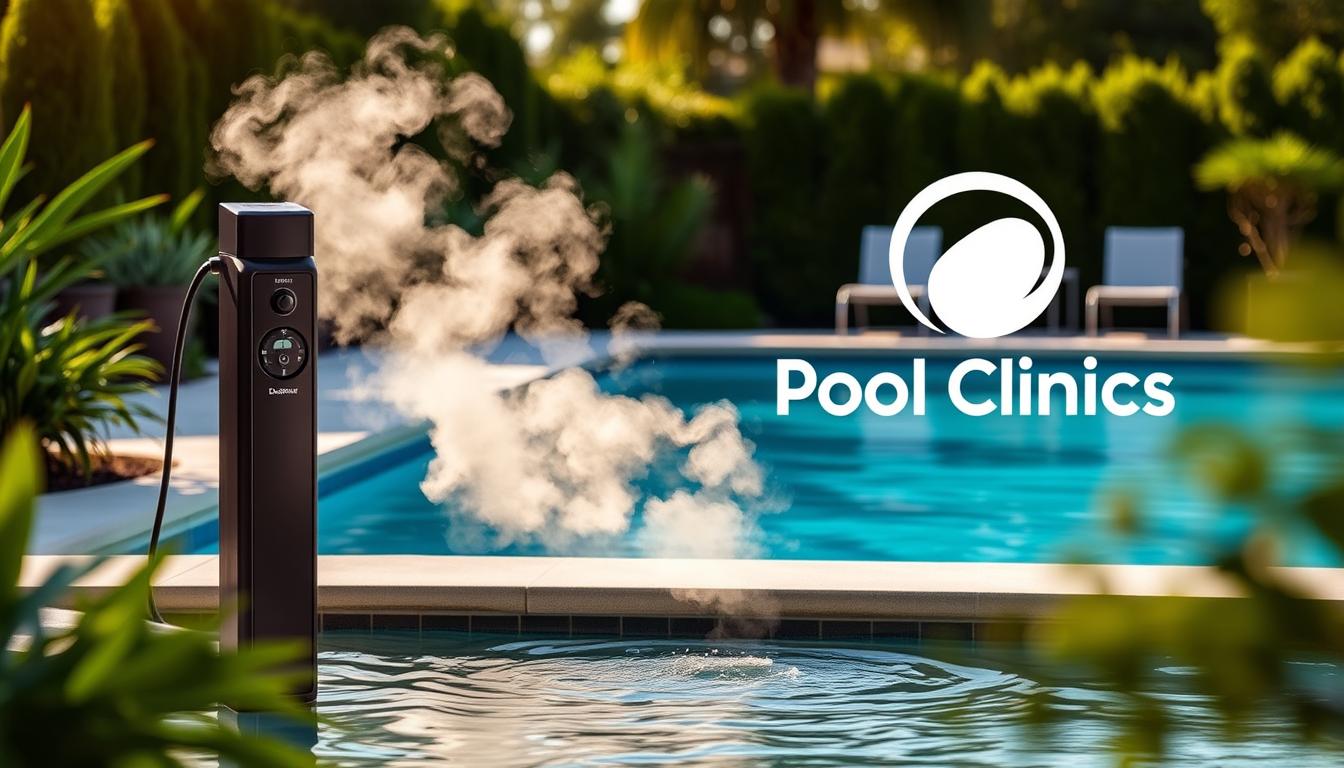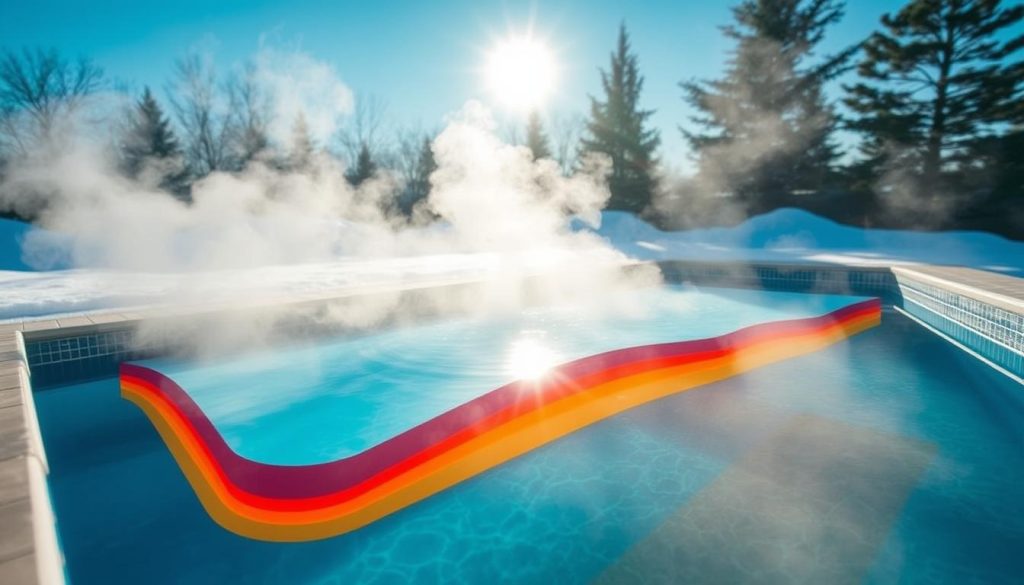
Imagine diving into your backyard pool, only to find icy water. Electric pool heaters solve this problem. They keep your pool at the perfect temperature. But how long does heating take?
The answer isn’t simple. Many factors affect heating time. These include pool size, starting temperature, and desired temperature. The heater’s size and efficiency also matter.
On average, electric heaters take 12-24 hours to warm a standard pool. This time can vary based on specific conditions.
Electric resistance heaters work well for smaller pools or spas. They’re not as fast as gas heaters. However, they offer better energy efficiency.
Understanding these factors helps optimize your heater’s performance. This knowledge ensures a warm, inviting pool all season long.
Key Takeaways
- Electric heaters typically take 12-24 hours to heat an average-sized pool
- Pool size, starting temperature, desired temperature, and heater efficiency affect heating time
- Electric resistance heaters are suitable for smaller pools or spas
- Electric heaters are more energy-efficient than gas heaters
- Optimizing electric heater performance can help maintain a comfortable pool temperature
Factors Affecting Pool Heating Time with Electric Heaters
Several factors impact how long it takes to heat your pool with an electric heater. Knowing these factors helps optimize your pool heating setup and performance.
Pool Size and Volume
The size of your pool affects heating time. Larger pools need more energy and time to heat up. This is because more water requires more heat to raise its temperature.
Starting Water Temperature
Initial water temperature is crucial for heating time. Colder water takes longer to heat up. Warmer starting temperatures lead to faster heating.

Desired Water Temperature
Your target temperature influences heating duration. Higher temperatures require more heating time. Balance comfort and energy efficiency when setting your pool temperature.
Heater Size and Efficiency
Heater size and efficiency are key factors in heating time. Larger, more powerful heaters work faster. Choose a heater that fits your pool size and heating needs.
| Heater Type | Heating Time | Efficiency |
|---|---|---|
| Gas Heater | 8-12 hours | Fast but less efficient |
| Electric Heat Pump | 16-48 hours | Slower but more efficient |
| Solar Heater | 24-72 hours | Eco-friendly but relies on sunlight |
Ambient Air Temperature and Weather Conditions
Air temperature and weather affect pool heating time. Colder climates make heaters work harder to maintain temperature. Wind increases heat loss through evaporation, leading to longer heating times.
Proper pool insulation and covers can improve heating efficiency. These tools help mitigate the effects of cold weather and wind.
Understanding these factors helps optimize electric pool heating systems. This knowledge leads to faster heating times and improved energy efficiency.
How Long Does It Take to Heat a Pool with an Electric Heater?
Electric pool heaters are reliable and efficient for warming your swimming pool. The heating time varies based on pool size, starting water temperature, and heater efficiency.
Average Heating Time for Various Pool Sizes
Electric heaters typically take 12 to 24 hours to heat a swimming pool. Smaller pools or spas may heat in as little as 8 hours.
Larger pools can take up to 48 hours to reach the desired temperature. The table below shows average heating times for different pool sizes.
| Pool Size (Gallons) | Average Heating Time (Hours) |
|---|---|
| 10,000 | 8-12 |
| 15,000 | 12-18 |
| 20,000 | 18-24 |
| 30,000 | 24-36 |
| 40,000 | 36-48 |
Comparison with Other Heating Methods
Electric heaters are faster than heat pumps, which can take 24-48 hours to warm a pool. Gas heaters are quickest, heating pools in just 8-12 hours.
The table below compares average heating times for different pool heating methods:
| Heating Method | Average Heating Time (Hours) |
|---|---|
| Gas Heater | 8-12 |
| Electric Heater | 12-24 |
| Heat Pump | 24-48 |
| Solar Heater | 48-72 |
Tips for Optimizing Electric Pool Heater Performance
To boost your electric pool heater’s efficiency and speed, try these tips:
- Ensure proper sizing and installation of the heater
- Maintain the heater regularly
- Use a pool cover to minimize heat loss when the pool is not in use
- Optimize water circulation by running your pool pump for at least 8 hours a day
- Monitor and maintain proper water chemistry to prevent scale buildup on the heater
Understanding these factors will help you enjoy a comfortable swim while maximizing your heater’s efficiency. You’ll get the most out of your electric pool heater for years to come.
Conclusion
Electric pool heaters offer reliable and energy-efficient heating for swimming pools. They may cost more upfront than gas heaters. However, their lower running costs and longer lifespan make them a smart long-term investment.
An electric pool heater can warm a standard pool in 12-24 hours. This timing depends on pool size, water temperature, and weather conditions. Gas heaters heat faster but use more fuel and struggle in cold climates.
Electric heat pumps maintain warmth efficiently over time. This results in lower operating costs. Using a pool cover with an electric heater can boost efficiency and reduce heating time.
Understanding these factors helps pool owners optimize their electric heater’s performance. With proper care, an electric heater provides cost-effective and eco-friendly pool heating. It ensures a comfortable swim throughout the season.







